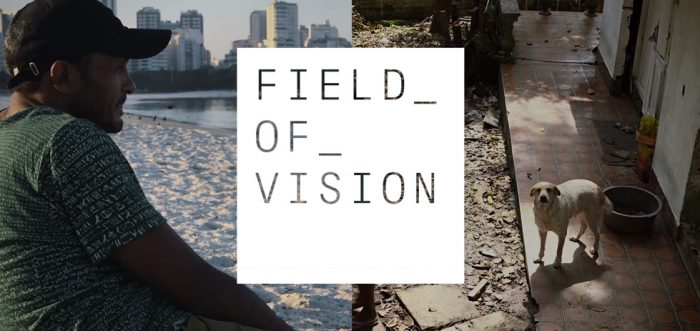Over the last few months our column We Like Shorts, Shorts has played host to a series of pieces about the new short documentary series Field of Vision, hosted over at The Intercept and co-created by Laura Poitras, AJ Schnack and Charlotte Cook.
Birdie – Jake Moody
Heloísa Passos’ Birdie, along with its companion piece Karollyne, is a curious addition to the Field of Vision collection, dealing with a more subdued, reflective story than many of its counterparts. The works conform to the project’s stated aim of depicting “developing and ongoing stories around the globe”, but move away from the political flashpoints of American and Middle Eastern social conflict to instead hone in on human stories in comparatively sedate, impoverished Brazilian settings. Birdie, though, is still absolutely effective in capturing a time and a place both far removed from and strangely close to the comfort enjoyed by its likely audience. Recording a day in the life of one Anderson Bernardes Carneiro—or “Birdie”—the film eschews both gritty favela realism and samba dynamism to show a more thoughtful side of global urban poverty.
Birdie is one of Rio de Janeiro’s roughly 5,000 homeless inhabitants, and makes a meagre living selling vegetables from a huge cart, which, aside from his meal ticket, is also his shelter, and the home of his two beloved dogs. Despite an upbeat protagonist and hardscrabble lifestyle readymade for pathos, Passos is less interested in placing Birdie’s poverty at the centre of a thriving tropical city than in exploring his mindset and worldview. There are no establishing shots, no cutaways to the beach or skyline, no Christ the Redeemer. Instead, the camera focuses on the grit of Birdie’s life: the ragged sheets he uses to both cover his wares and sleep on, the way the smaller dog’s paws rest at a comical angle as she sleeps on his chest. The work’s greatest strength is how it universalises the built and social environments by placing them in the background, and strips away the otherness of Birdie’s life through intimate closeness. Birdie speaks to the quiet drama of everyday life underpinning the news headlines in globalised 2016, and hence it is tied to the rest of the Field of Vision canon.
The piece looks to build on its deliberate imagery through a voiceover and several to-camera segments where Birdie muses on life, animals, and society, as well as expounding on his own past. One of the thousands who migrate from the arid Brazilian northwest to the southern metropolises, Birdie freely admits that he came to Rio “to become a bandit… I could shoot and be shot, nothing more.” His wayward youth ended in a firefight and twelve years in prison—while never explicitly stated, one feels that his kindness to his pets and apparent happiness in his ramshackle life are symptoms of a need to repent for his former violence. Passos keenly draws out touching moments of introspection from her star, such as when he talks of asking middle-class women for money for dog food because he knows they won’t give him a cent for himself. The film’s fourteen minutes could perhaps have done with another five, though, if only to spend more time with Birdie and his ‘girls’ in their moments of almost familial warmth. Birdie should be praised for one achievement above any other: given the opportunity to rail on Rio in its often corrupt, wildly unequal Olympic-year grandeur, it tells a story far more powerful by defusing politics in favour of hopeful and restrained storytelling.
Karollyne – Lidiya Josifova
Heloísa Passos has a way of subverting that familiar idea of the documentarian being in control. Instead, she appears to strive to make her work a vessel. Nor does her work become an exercise in her relationship to her work’s subjects—she seems to exist entirely out of sight and out of mind, permitting the quiet, inexorable bond of devotion and companionship between Karollyne’s subjects to anchor her documentary short. Its subjects? The eponymous protagonist, Karol, and the animals that she has rescued from the roadside near her home. While a collection of her friends also live at the deserted house where they have taken up residence, the bond—more akin to companionship than ownership—between Karol and the animals underscores every shot, linking up moments and fragments from everyday life that then blend into a seamless, restrained 15 minutes.
There are allusions to Karol’s much more difficult past. The subtlety and dignity in opting not to probe too deep into this aspect of her life is a choice that allows the short to succeed. It transforms into a microcosmic story that tells the truth of Karol’s humanity, her goodwill and sense of responsibility towards the animals. It takes one snippet of dialogue from Karol and a flow of static shots of the partially-dilapidated house in which she and her friends live to establish her backstory of struggle and hardship. Passos passes on delving into material that would sell out her protagonist for sentimentality or a deeper ‘emotional resonance’. What she uses is enough to contrast against Karol’s past to demonstrate the significance of her caring for those abandoned animals.
A meditative mood suffuses the short. At one point, Karol ruminates on the desertion of her mother, while cleaning some crockery on the concrete next to her pool. Passos invites us to pause for a moment on that revelation, a kind of visual contemplation, when the subsequent shows her reflection, hands working with a hose to rinse a pot. It’s a quiet, dignified moment. The manner in which Passos has structured her dialogue against pure diegetic, locational sound makes Karollyne act as a kind of memoir. In recounting parts of her life and the story of how she, her friends, and the animals have come to live in their house, Karol speaks both to Passos and beyond her, directly to us, the audience. With these elements at play, it’s easy to appreciate the true calibre of documentary filmmaking in Karollyne.
